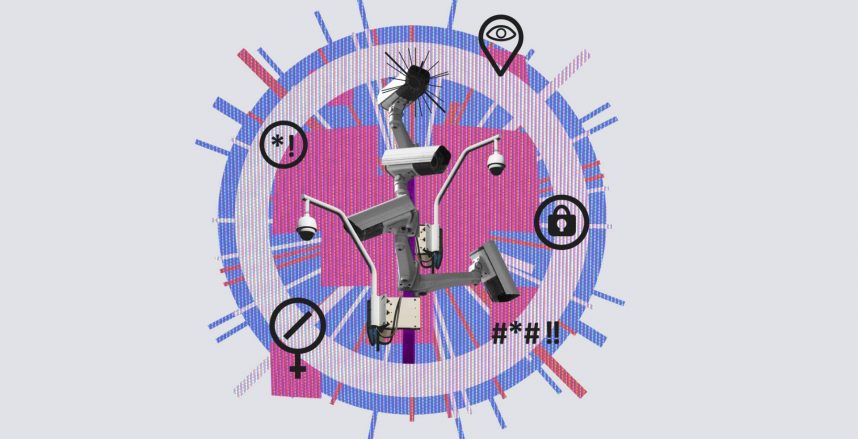
From Budapest to Ankara, online freedoms are being compromised by government legislation, emerging technologies and tech giant algorithms, says BIRN’s new annual report on digital rights violations in Central and Southeast Europe.
“Moreover, phishing attempts across the region, cyber-attacks and weak responses target digital economies and pose specific threats to some countries,” the report adds.
The report also highlights emerging threats, particularly AI-generated videos, photos and even voice recordings that pose a risk to economies and elections, examples of which were identified in Turkey, Serbia and Croatia, among others.
The report draws attention to the use of “harmful legislation” by governments, including Russian-style laws labelling foreign-funded organisations ‘foreign agents’ either introduced or proposed by lawmakers in countries such as Hungary, Turkey and Bosnia’s Serb-dominated Republika Srpska entity.
“The legislation has received harsh criticism from NGOs, independent media and international organisations,” the report says.
Legislation vs digital freedoms

Hungarian Prime Minister Viktor Orban delivers a speech in Budapest, October 2024. Photo: EPA-EFE/Szilard Koszticsak.
Besides ‘foreign agents’ laws, BIRN’s report draws attention to other worrying legislative initiatives by governments of some of the countries monitored.
These include Albania’s Ad Hoc Parliamentary Committee on Disinformation in 2024, tasked with looking into disinformation and foreign interference in media and democratic processes but criticised for its potential to restrict media freedom.
In Kosovo too, the government adopted in July this year a new Law on Independent Media establishing regulatory control over audiovisual content on online platforms.
“The Association of Kosovo Journalists, AGK has called the proposed changes to the new Law on the Independent Media Commission, IMC, an attempt by the government to control online media that have video content,” says the BIRN report. “This law is currently being revised by the Kosovo Constitutional Court due to opposition and civil society objections.”
Among the emerging threats is the malicious use of AI, a danger that governments have been slow to wake up to.
Albania, the report notes, “continues to have no legislation regulating the use of AI”, while in North Macedonia “there is no accurate data which could be provided by authorities on the use of AI for criminal purposes”.
“Similarly, in Montenegro, the Criminal Code does not define AI-generated manipulations per se,” the report says.
BIRN digital rights monitors also identified a surge in AI-powered cybercrime.
“Cybercrime cases have been constantly emerging, affecting the digital safety of citizens in the region,” the report states. “Some of the recurring cybercrime trends detected through our monitoring involve phishing scams involving post offices, banks and other institutions. Scammers have also impersonated celebrities, political figures and journalists.”
In Croatia, for example, there were 20 cases of content manipulation during the reporting period, representing 14 per cent of the total number of digital rights violations in the EU country.
“These actions, often driven by artificial intelligence, were used to promote fraudulent schemes, mislead the public, and manipulate perceptions,” the report says.
“The main targets of these manipulations are Croatian citizens, public figures, politicians, and prominent individuals such as singers, actors, and entrepreneurs, as monitoring analysis shows. Attackers include fake accounts, scammers, and those using AI tools to create false ads or deepfakes, often linked to dubious investment platforms.”
Big Tech algorithms cause concerns

BIRN’s monitoring also identified issues with algorithms employed by the major tech companies. These are applied globally but are not adjusted to local contexts.
“This creates several problems for the local media, as the algorithms remain inconsistent and non-transparent,” the report explains. “The biggest example of this occurred in Bosnia when Meta started taking down content that mentioned the word ‘genocide’ during the Srebrenica Memorial Day [in July]. This so-called shadow-banning has happened to BIRN too, with content instantly disappearing from our social media pages.”
The report underlines the importance of legal protections and sanctions, citing the example of the EU.
“The EU provides better protection and can impose more concrete sanctions than the Western Balkan countries,” it says.
“This is both due to the developing EU regulations and the fact that the EU represents a much bigger market than the [Western Balkan] countries,” it adds. “An example of such adherence to the bigger markets by Big Tech can be seen in Turkey where large social media companies accept often non-democratic and untransparent regulations for the sake of preserving their audience.”
In August 2024, for example, X – formerly known as Twitter – agreed to appoint a representative in Turkey as required by the government, likely fearing more sanctions after an advertising ban was imposed.
“More worryingly, the first transparency report issued under CEO Elon Musk’s ownership of X in September 2024, revealed that Turkey ranked second only to Japan in government requests for content removal during the first half of 2024,” BIRN’s report says.
X received 9,364 requests from Turkey, with the company acting on 68 per cent of them, marking a significant rise in the platform’s compliance with government demands compared to previous years.
Read the full report here.